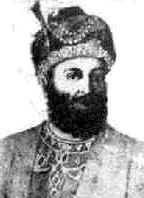
Mahmud Shah Durrani was born Prince and the ruler of the Durrani Empire (Afghanistan) between 1801 and 1803, and again between 1809 and 1818. An ethnic Sadduzai tribe section of the Popalzai sub clan of Durrani Abdali Pashtun, he was the son of Timur Shah Durrani and grandson of Ahmad Shah Durrani.

Mohammad Shah Qajar was the Shah of Qajar Iran from 23 October 1834 to 5 September 1848.
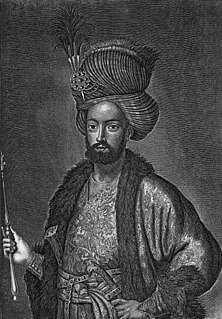
Sultan Husayn, reigned 1694–1722; was a Safavid Shah of Iran (Persia). He ruled from 1694 until he was overthrown in 1722 by rebellious marauder Mahmud Hotaki, an Afghan of Pashtun ethnic background. His reign saw the downfall of the Safavid dynasty, which had ruled Persia since the beginning of the 16th century.

Muhammad Shaybani Khan, was an Uzbek leader who consolidated various Uzbek tribes and laid the foundations for their ascendance in Transoxiana and the establishment of the Khanate of Bukhara. He was a Shaybanid or descendant of Shiban, the fifth son of Jochi, Genghis Khan's eldest son. He was the son of Shah-Budag, thus a grandson of the Uzbek conqueror Abu'l-Khayr Khan.
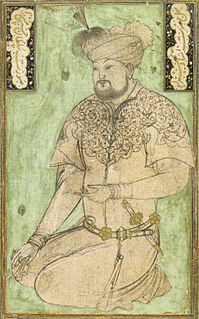
Sultan Husayn Bayqara Mirza was the Timurid ruler of Herat from 1469 until May 4, 1506, with a brief interruption in 1470.
Ibrahim Mirza was a Timurid ruler of Herat in the fifteenth century. He was the son of Ala al-Dawla Mirza, a great-grandson of Timur.
The Arghun dynasty was a dynasty of either Mongol, Turkic or Turco-Mongol ethnicity, who ruled over the area between southern Afghanistan, and the Sindh province Pakistan from the late 15th century to the early 16th century. The Arghuns claimed their descent and name from Ilkhanid-Mongol Arghun Khan. Arghun rule can be divided into two branches: the Arghun branch of Dhu'l-Nun Beg Arghun that ruled until 1554, and the Tarkhan branch of Muhammad 'Isa Tarkhan that ruled until 1591.
Yadgar Muhammad Mirza was the Timurid ruler of Herat in opposition to Sultan Husayn Mirza Bayqarah for 6 weeks of 1470.
Abdal-Latif Mirza was the great-grandson of Central Asian emperor Timur. He was the third son of Ulugh Beg, Timurid ruler of Transoxiana.

Kamran Mirza, was a Persian Prince of Qajar Dynasty and third surviving son of Nasser al-Din Shah. He was the brother of Mass'oud Mirza Zell-e Soltan and Mozzafar al-Din Shah. He was also the progenitor of the Kamrani Family. He might have been Prime minister of Iran for a few days in April–May 1909, but this is not clearly referenced. Kamran Mirza also served as Iran's Commander-in-Chief, appointed in 1868 for the first time, and minister of war from 1880 to 1896 and from 1906 to 1907.
Muhammad Zaman Mirza (1496–1539) was a Timurid prince, and general to Mughal Emperors Babur and Humayun. He claimed himself as the ruler of Gujarat in 1537 but did not gain actual control.

Ghiyath ud-din Baysunghur, commonly known as Baysonqor or Baysongor, Baysonghor or (incorrectly) as Baysunqar, also called Sultan Bāysonḡor Bahādor Khan was a prince from the house of Timurids. He was known as a patron of arts and architecture, the leading patron of the Persian miniature in Persia, commissioning the Baysonghor Shahnameh and other works, as well as being a prominent calligrapher.

Abu Sa'id Mirza was the ruler of the Timurid Empire during the mid-fifteenth century.
Abul-Qasim Babur Mirza, was a Timurid ruler in Khurasan (1449–1457). He was the son of Ghiyath-ud-din Baysunghur ibn Shah Rukh Mirza, and thus a great-grandson of Amir Timur.

Battle of Sarakhs took place in March 1459, at a location between Merv and Sarakhs.
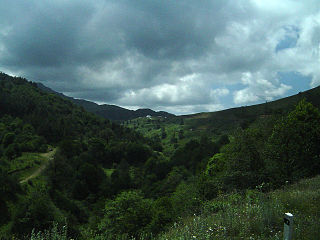
The Battle of Qarabagh was fought on February 4, 1469, between Aq Qoyunlu under Uzun Hasan, and the Timurids of Samarkand under Abu Sa'id Mirza, resulting in the latter's defeat, imprisonment and execution. After the battle, the Timurids forever lost any hopes of gaining Iraq or Iran back into their kingdom.
After the death of Shah Rukh, Gawhar Shad allowed Abdal-Latif Mirza to be the commander of his army despite reservations of the Tarkhans as well as the reservations of Baysunghur Mirza's sons, especially Abul-Qasim Babur Mirza who was present there at the camp. Gawhar Shad wanted to please Ulugh Beg but at the same time encouraged the Baysunghur brothers to rebel. She contacted Ala al-Dawla Mirza at Herat conveying her sentiments. Therefore, Abul-Qasim Babur Mirza along with Khalil Sultan, son of Muhammad Jahangir and a daughter of Shah Rukh along with their troops raided the Urdu Bazar or Camp Market and went on towards Ala al-Dawla Mirza at Herat. As soon as Abdal-Latif Mirza got his army in order after several executions he marched towards Damghan and on his way imprisoned Gawhar Shad his grandmother and the Tarkhans.
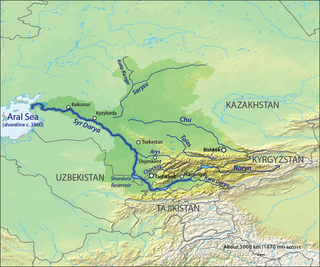
Abu Sa'id Mirza occupied Herat on July 19, 1457. But he had to immediately abandon the city in order to deal with the Balkh revolt by the sons of Abdal-Latif Mirza, one of whom he killed in battle while the other Juki Mirza escaped to the steppes in the north under the protection of Abul-Khayr Khan, the Khan of the Uzbek principality of Tura, a part of the empire of Desht-i Kipchak region that lies to the east of Ural mountains.
Sultan Mahmud Mirza was a prince of Timurid branch of Transoxiana, son of Abu Sa'id Mirza.
Rukn-ud-din Ala al-Dawla Mirza, also spelt Ala ud-Dawla and Ala ud-Daula, was a Timurid prince and a grandson of the Central Asian ruler Shah Rukh. Following his grandfather's death, Ala al-Dawla became embroiled in the ensuing succession struggle. Though he initially possessed a strategic advantage, he was eventually overtaken by his more successful rivals. Ala al-Dawla died in exile after numerous failed attempts to gain the throne.










